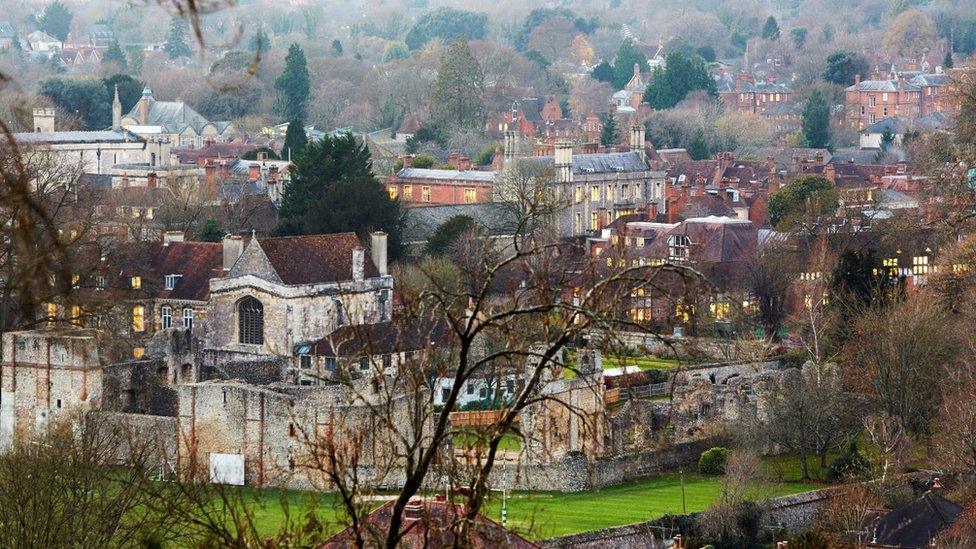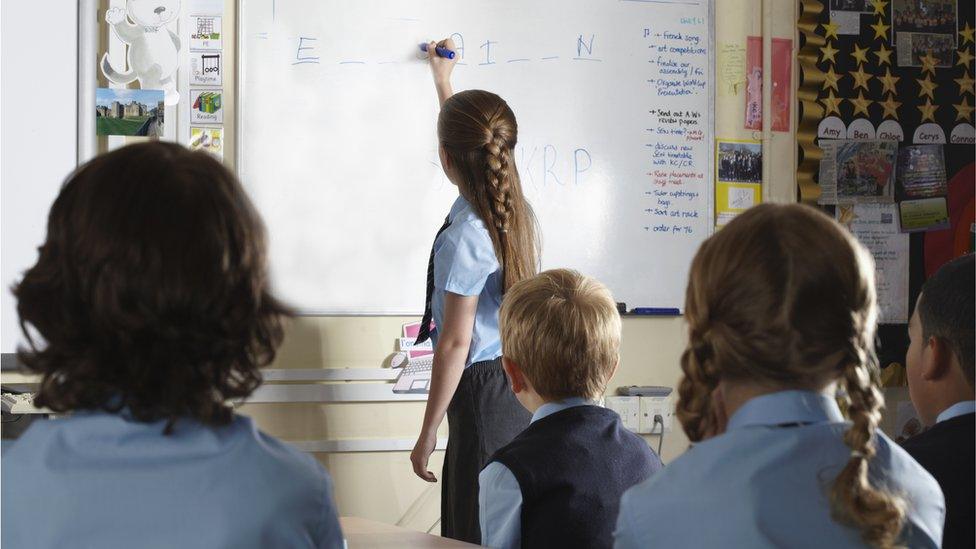PMQs: Keir Starmer calls on Rishi Sunak to end 'scandal' of private school tax breaks
- Published
- comments
The Labour leader questions the PM on private school "handouts"
Labour leader Sir Keir Starmer has called on Prime Minister Rishi Sunak to end the "scandal" of tax breaks for private schools.
Private schools can claim charitable status so are eligible for tax relief.
During Prime Minister's Questions, Sir Keir highlighted the Mr Sunak's old school, Winchester College, and asked why it received "taxpayers' money".
But Mr Sunak accused the Labour leader of "attacking the hard-working aspiration of millions of people".
Most private schools have charitable status, which means they are exempt from paying VAT on school fees.
In England and Wales, private schools with charitable status also get at least 80% relief on business rates.
However, in Scotland this discount was removed in April.
Sir Keir clashed with Mr Sunak over the issue during PMQs and took aim at Mr Sunak's old independent school.
"Winchester College has a rowing club, a rifle club, an extensive art collection, they charge over £45,000 a year in fees," he said.
"Why did [the prime minister] hand them nearly £6m of taxpayers' money this year in what his Levelling Up Secretary [Michael Gove] calls egregious state support?"
Mr Sunak responded: "Whenever he attacks me about where I went to school, he is attacking the hard-working aspiration of millions of people in this country, he's attacking people like my parents.
"This is a country that believes in opportunity not resentment. He doesn't understand that and that's why he's not fit to lead."
In a 2017 column for the Times, external, Mr Gove asked how tax breaks for private schools were "justified", describing this as "egregious state support".
A YouGov poll in September, external found 47% of people thought private schools should lose their tax exemptions.
But the Independent Schools Council has warned Labour's proposals to charge VAT on private school fees would "have the greatest impact on the families who work the hardest to pay the fees", describing the idea as a "tax on aspiration".
It said the policy would "threaten the survival of the smallest independent schools" and see more pupils move to the state sector, putting more pressure on the schools budget.

Winchester is a boarding school for boys from 13 to 18-years-old, with girls admitted in the sixth form
Sir Keir suggested the money for private school tax exemptions would be better spent driving up standards in the state sector.
If it wins power, Labour has said it would use the savings to fund the "most ambitious school improvement programme for a generation".
In response Mr Sunak said the government had already announced billions more in funding for state schools and standards had improved under the Conservatives.
Sir Keir also used PMQs to attack Mr Sunak as "weak", highlighting an attempt by some Tory MPs to ban mandatory housebuilding targets in England.
The government delayed a vote after nearly 50 rebels backed the idea.
Sir Keir said Labour would lend the government the votes it needs to pass the Levelling-up and Regeneration Bill with mandatory housing targets.


Two days in a row this week, the Daily Mail has been gunning for Labour on the issue of private schools and Sir Keir Starmer's policy that their charitable status should be removed - meaning VAT would be payable on school fees.
So it is interesting that Sir Keir has decided to lean into it at PMQs, rather than talk about something else - and highlight it as a dividing line with the Conservative Party.
And it is interesting too that the prime minister uses the language of "aspiration" to champion his perspective that the current arrangement is justified and in the interests of parents and pupils in both the private and state sectors.
The big picture strategy from the Labour Party is to try to portray Rishi Sunak as weak and beholden to his backbenchers.
Hence Sir Keir's offer to back the government's plan - which Mr Sunak avoided mentioning - to maintain housebuilding targets in England, which some Tory backbenchers want rid of.
The Conservative parliamentary party is relieved that Mr Sunak has brought stability - it being better than the alternative of perpetual meltdown.
But the PM's challenge heading into 2023 will be how much he can actually get done.

Related topics
- Published8 October 2021
